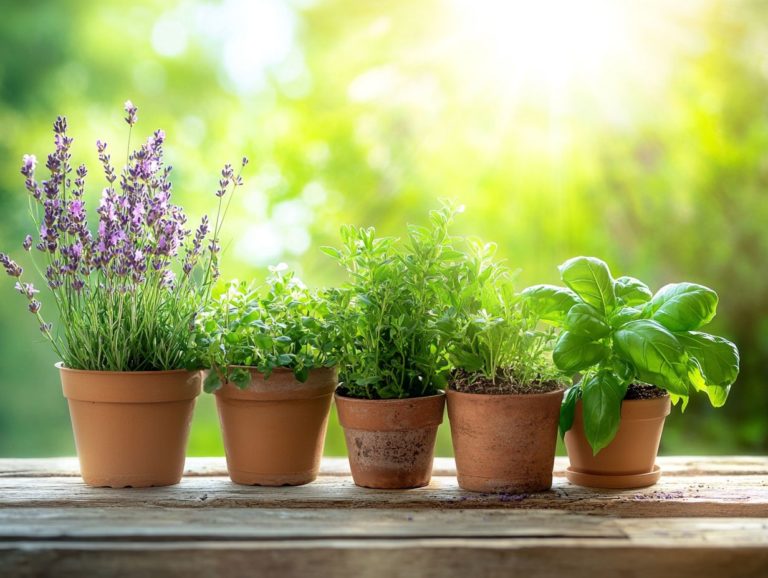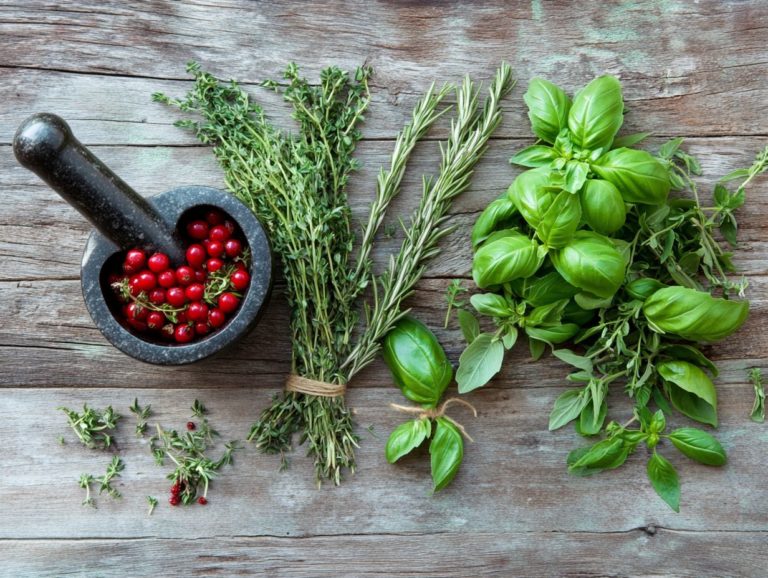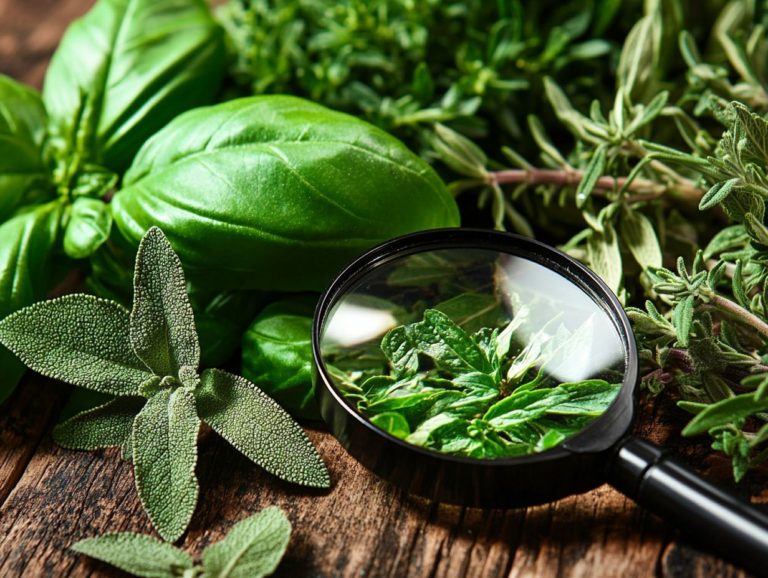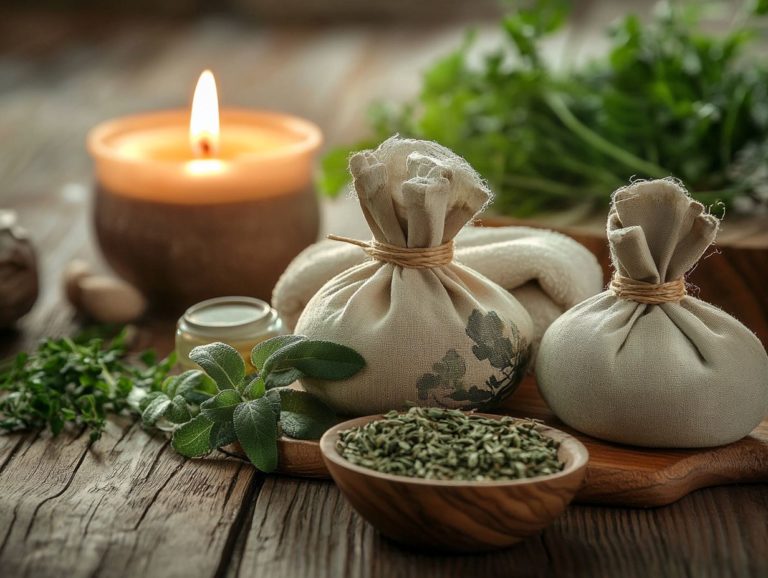How to Find Reliable Sources for Herbal Information?
Navigating the realm of herbal information can feel daunting. The sheer volume of resources available today complicates this process.
Understanding what constitutes reliable information is essential for anyone eager to explore the benefits and uses of herbs. This guide will lead you through a variety of trustworthy sources, including expert opinions, scientific studies, traditional knowledge, and insights from regulatory agencies.
You will learn how to evaluate the credibility of these sources, along with practical tips for uncovering the most accurate herbal information. Embark on this journey as you discover the essentials of sourcing reliable herbal insights.
Contents
- Key Takeaways:
- Understanding Herbal Information
- The Importance of Reliable Sources
- Types of Reliable Sources for Herbal Information
- How to Evaluate the Credibility of Sources
- Factors to Consider in Evaluating Sources
- Tips for Finding Reliable Sources
- Frequently Asked Questions
- How can I find reliable sources for herbal information?
- What are some key characteristics of a reliable source for herbal information?
- Can I trust information found on social media or blogs?
- Are peer-reviewed journals a good source for herbal information?
- Is it necessary to consult multiple sources for herbal information?
- What are some red flags to look out for when evaluating sources for herbal information?
Key Takeaways:

- Always prioritize finding reliable sources for herbal information to ensure accuracy and safety.
- Expert opinions, traditional knowledge, and regulatory agencies are all valuable sources for credible herbal information.
- Evaluate the credibility of sources by considering factors such as author qualifications, references, and bias.
Understanding Herbal Information
Understanding herbal information is essential for you if you re looking to enhance your health and wellness through herbal supplements and natural remedies. Herbal medicine has a long-standing tradition, utilizing various plants like Echinacea, Ginkgo, and St. John s Wort, each celebrated for its therapeutic properties.
This knowledge empowers you to make smart choices about dietary supplements, ensuring you select safe and effective options tailored to your specific health needs. As we explore this topic further, you’ll see the importance of reliable sources and how research plays a critical role in grasping the intricacies of herbal medicine, including how to read herbal medicine research.
What is Herbal Information?
Herbal information encompasses a wealth of knowledge about the use of herbs and plants in medicine, focusing primarily on their therapeutic properties, safety, and potential health benefits.
This rich tapestry of understanding stretches back centuries, originating from ancient civilizations that harnessed the power of botanicals for healing. Various types of herbalism be it traditional, Western, or Chinese each offer unique perspectives and methodologies that enrich the craft.
The significance of dietary supplements derived from these sources plays a crucial role in holistic health. These remedies provide a natural alternative or complement to conventional medicine, addressing the whole person body, mind, and spirit.
By integrating this age-old wisdom with modern research, you can cultivate a deeper appreciation for the myriad ways herbal remedies can contribute to your well-being.
The Importance of Reliable Sources
In the realm of herbal medicine, the importance of getting information from reliable sources cannot be overstated. This knowledge directly influences the safety and efficacy of herbal supplements, which can provide therapeutic benefits for health and wellness.
For anyone contemplating the use of products like Echinacea or Ginkgo to address various health conditions, including chronic illnesses, finding trustworthy data is essential for your health!
Why is it Important to Find Reliable Sources?
Finding reliable sources for herbal information is crucial for ensuring the safety and effectiveness of herbal medicine. Inaccurate information can lead to negative health consequences and unexpected interactions with other medications.
Without proper verification, you may unwittingly expose yourself to harmful substances or ineffective treatments. Organizations like the FDA play a vital role in regulating and testing the quality of herbal supplements, ensuring that what you purchase meets established safety standards.
By bypassing reputable research and regulatory guidance, you not only jeopardize your health but also risk encountering unexpected side effects that could worsen existing conditions. A lack of due diligence in seeking trustworthy information can significantly undermine the potential benefits of herbal remedies and lead to long-term repercussions for your overall wellness.
Types of Reliable Sources for Herbal Information

You have access to a wealth of reliable sources for accurate herbal information, including:
- Expert opinions
- Scientific studies
- Traditional knowledge
- Insights from regulatory agencies
- Organizations
These resources are invaluable for anyone seeking to harness the therapeutic properties of herbs like American Ginseng, Aloe Vera, or Valerian in a safe and informed manner.
Expert Opinions and Scientific Studies
Expert opinions and scientific studies offer valuable insights into the therapeutic effects and safety of various herbal supplements. They are supported by rigorous research and thorough evaluation of data from controlled environments.
Peer-reviewed studies, which are examined by experts before publication, ensure the validity and reliability of findings. Reputable institutions like the National Institutes of Health share credible information and fund research initiatives that illuminate the interactions between herbal remedies and human health.
This process helps you make informed decisions about herbal usage.
Traditional Knowledge and Practices
Traditional knowledge surrounding herbal medicine provides insights into the cultural significance and historical context of various herbs.
By integrating age-old practices with modern methodologies, you can uncover a richer narrative that goes beyond the botanical properties of plants. It delves into the rituals and beliefs that have shaped their usage through generations.
This fusion fosters appreciation for the wisdom embedded in cultural traditions, illustrating how heritage influences health approaches and healing practices.
The dialogue between traditional knowledge and contemporary science evolves, showing that traditional practices provide a framework complementing empirical research. Such collaborations pave the way for innovative treatments that respect both the past and the future of healthcare.
Regulatory Agencies and Organizations
Regulatory agencies and organizations like the FDA oversee the safety and efficacy of herbal supplements, ensuring you have access to reliable information.
These bodies establish stringent standards that manufacturers must follow. This includes rigorous testing and labeling requirements, aimed at preventing the marketing of potentially harmful products.
Regulatory agencies frequently update their guidelines in response to emerging research and public health concerns, showcasing their dynamic role in the herbal supplement landscape. This provides you with a layer of assurance, cultivating a marketplace where informed choices can be made with confidence.
How to Evaluate the Credibility of Sources
Evaluating the credibility of sources is crucial for discerning reliable herbal information. This ensures that the data you gather is both accurate and trustworthy for your health-related decisions.
This process requires examining research methods, the qualifications of the authors, and the presence of peer-reviewed material. By taking these steps, you enable yourself to make informed choices that can significantly impact your well-being.
Are you ready to explore the fascinating world of herbal remedies? Act now to ensure you’re getting the best information available!
Factors to Consider in Evaluating Sources

When evaluating sources for herbal information, consider factors like the author’s expertise, potential biases, and the quality of the research.
Investigate the credentials of the authors. Professionals with backgrounds in botany, pharmacology, or herbal medicine offer more reliable insights. Recognizing any inherent biases is also crucial; authors linked to businesses that may profit from the products might present skewed information. To ensure safety, it’s important to know how to determine if an herb is safe. Assess the research quality by examining the methodology, sample size, and whether the studies have been reviewed by experts.
Remember to check for citations from reputable journals and seek consensus among various credible sources. This will help ensure that the information you gather aligns with established research findings and is based on solid ground.
Tips for Finding Reliable Sources
Finding trustworthy sources for herbal information is vital for safe and effective use of herbal supplements. Use smart strategies to improve the quality of the information you gather.
Master effective research practices to navigate the extensive range of resources available.
Strategies for Finding Trustworthy Information
Use effective strategies to find trustworthy information on herbal medicine to make informed health decisions.
Start by utilizing reputable academic databases that provide scholarly articles and studies reviewed by experts. This ensures that you access information grounded in scientific evidence. Consult reputable manufacturers for quality herbal products and seek guidance from healthcare professionals who can offer insights on the safety and efficacy of various herbal remedies and their potential interactions with other medications. Additionally, learn how to choose quality herbal products for the best results.
Check resources from established organizations dedicated to herbal medicine for comprehensive guidelines and reliable data about the benefits of plants like Echinacea and American Ginseng. By using these strategies, you can navigate the often overwhelming sea of information and identify trustworthy sources. For more insights, refer to best practices for herbal remedy use, promoting a more educated approach to your health choices, including the use of dietary supplements for wellness.
Frequently Asked Questions
How can I find reliable sources for herbal information?
To find reliable sources, look for websites or publications by experts in herbalism that provide information about natural remedies. These sources are often more accurate and trustworthy.
What are some key characteristics of a reliable source for herbal information?

A reliable source should include references and citations to support the information and provide evidence-based research on the properties of various herbal extracts. It should be current and unbiased, free from conflicts of interest.
Be cautious when using social media or blogs for herbal information, especially those claiming health benefits without scientific support. Some may be written by experts, while others might not be accurate. Always double-check the information and seek reliable sources to confirm it.
Are peer-reviewed journals a good source for herbal information?
Yes, peer-reviewed journals are reliable sources for herbal information as they undergo a rigorous review process by experts in the field. However, check the credibility of the author and any potential conflicts of interest.
Is it necessary to consult multiple sources for herbal information?
Yes, consulting multiple sources for herbal information is crucial. It ensures accuracy and reliability, giving you a broader understanding.
What are some red flags to look out for when evaluating sources for herbal information?
Watch out for sources that make strong claims about what herbal supplements can do. They might not give you the full story about possible side effects.
Check the qualifications of the author or organization sharing the information. Being informed protects your health and wellness!






